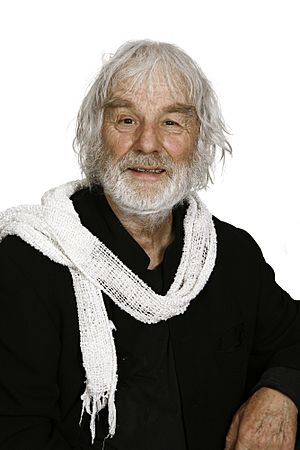Ernst Sieber facts for kids
Quick facts for kids
Ernst Sieber
|
|
|---|---|

Ernst Sieber in 2007
|
|
| Born | 24 February 1927 Horgen, Switzerland
|
| Died | 19 May 2018 (aged 91) |
| Nationality | Swiss |
| Alma mater | University of Zürich |
| Occupation | Swiss pastor, social worker, writer and former politician |
| Years active | 1957–2018 |
|
Notable work
|
Founder of the Sozialwerke Pfarrer Sieber foundation and relief organisation |
| Spouse(s) | Sonja Sieber-Vassalli |
| Children | 5 |
| Awards | Ernst Sieber#Awards |
Ernst Sieber (24 February 1927 – 19 May 2018) was a Swiss pastor and social worker. He was very well-known for his work helping people in need. He belonged to the Swiss Reformed Church.
In 1963, he started helping homeless people. This led to him creating the Sozialwerke Pfarrer Sieber foundation in 1988. This group helps people who are sick, homeless, or facing violence. Sieber also wrote books about his work. The money from these books helped fund his foundation.
From 1991 to 1995, he was a politician. He represented the area of Canton of Zürich in the Nationalrat. This is the lower house of the Swiss parliament.
Contents
Early Life and Education
Ernst Sieber was born in Horgen, a town near Zürichsee. His parents were Katharina Josepha Hess and Hans Sieber. He described himself as a "dreamy child." He loved fishing with his brother more than school. But he also said he always cared about fairness. He especially cared about the most vulnerable people.
Sieber first worked on a farm in French-speaking Switzerland. He finished agricultural school in Zürich in 1947. Later, in 1950, he earned a special diploma. This allowed him to study theology. He then studied at the University of Zürich. He became a pastor in 1956.
Helping People in Need
As a pastor, Ernst Sieber worked with people on the edges of society. He served as a community and prison chaplain. From 1956 to 1967, he worked in Uitikon-Waldegg. Then, in 1967, he became a parish priest in Zürich-Altstetten. He worked there until he retired in 1992.
In the winter of 1963, Sieber opened a shelter. It was for homeless and marginalized people in Zürich-Aussersihl. This was the start of his big social work.
With help from his wife, Sonja Sieber Vassalli, and many others, Sieber started many projects. These projects were in Zürich and nearby areas. From 1988 to 1992, he was a dean for part of Zürich. In 2013, the city of Zürich honored him. Mayor Corine Mauch gave him the Staatssiegel von Zürich. This award recognized his life's work.
Sozialwerke Pfarrer Sieber: A Helping Hand
In 1963, Ernst Sieber created the first community for homeless people. It was in an old bunker in Zürich-Aussersihl. This was the beginning of the charity called Sozialwerke Pfarrer Sieber (SWS).
Over the years, SWS started many projects. These include places like Sune-Dörfli and Sune-Egge. They also have Pfuusbus, a bus that offers shelter. The Brothausen settlement in Zürich-Affoltern is another place for homeless people. SWS also provides food supplements to poor people. They work with Swiss stores to do this.
The foundation was officially set up in 1988. Its goal is to help people based on Christian values. They want to ease suffering from illness, violence, and homelessness. SWS sees its work as a modern way to apply biblical messages. They help people who are struggling mentally, physically, or socially. They also help those who are homeless or seeking refuge.
SWS works with individuals, private groups, and churches. They offer pastoral, social, medical, and practical help. They believe in working together to provide support.
Later Life and Passing
Ernst Sieber passed away on 19 May 2018. He was 91 years old. He died at Triemli Hospital in Zurich.
Awards and Recognition
Ernst Sieber received several awards for his important work:
- 2017: Prix-Courage-Lifetime-Award
- 2013: Staatssiegel von Zürich (Seal of the City of Zürich)
- 1987: Honorary Doctorate from the Theological Faculty of the University of Zürich
Further Reading
- Daniel J. Schütz: Der Pfarrer: Begegnungen mit Ernst Sieber. Zytglogge, Oberhofen 2008, ISBN: 978-3-7296-0753-8.
 | James Van Der Zee |
 | Alma Thomas |
 | Ellis Wilson |
 | Margaret Taylor-Burroughs |

